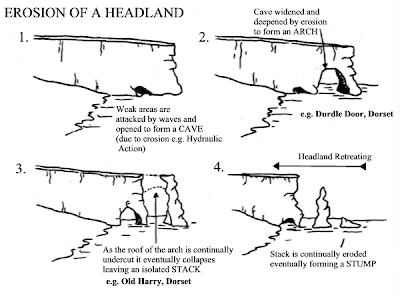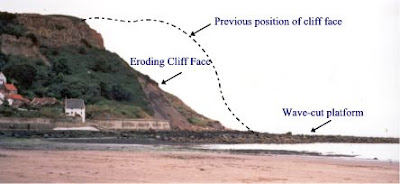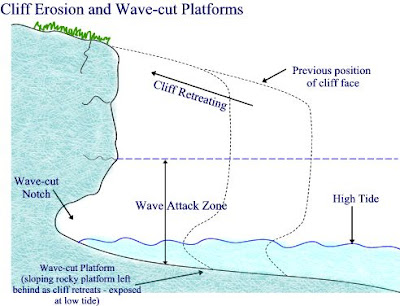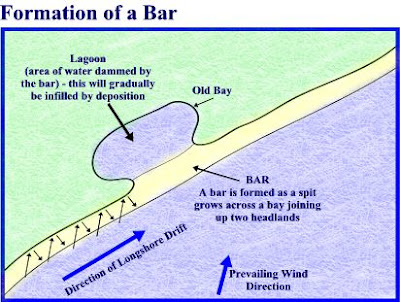Coastal Processes was a long module and looking through what we have done i felt that some revision notes were necessary, as usual you will get a sheet in class however there are do many digital resources out there that I thought I would try and detail them here.
The main areas we have covered and what you need to revise, are:
• Energy at the coast - types of waves and basic principles behind wave formation / factors affecting the strength of waves.
• Coastal Processes - erosion processes (you need to be able to describe the processes and how they work); transport processes (you must be able to talk through the process of longshore drift and it helps if you are able to draw an annotated diagram to show the process) and deposition.
• Coastal Erosion Landforms - you must be able to talk through both the features and formation of the following landforms: cliffs; wave-cut platforms; headlands and bays; caves, arches, stacks and stumps (in your description and explanation of formation always include some examples of named erosion processes that may be at work). You should also be able to draw annotated diagrams of the features to show how they form as well as knowing named examples of each.
• Coastal Deposition Landforms - you must be able to talk through both the features and formation of the following landforms: beaches; spits; bars and tombolos. You should be able to draw annotated diagrams of the features to show how they form as well as knowing named examples of each.
• Case Study of Coastal Erosion - learn (including detail - i.e. location, facts and figures) a case study of coastal erosion.
• Coastal Defense - you need to be aware of the options for coastal defense - hard engineering, soft engineering or managed retreat. You should be able to describe coastal management techniques and be able to discuss their advantages and disadvantages.
• Case Study of Coastal Defense - You should learn a named case study to back this up
Energy at the Coast

You need to know the difference between the two main types of wave, constructive and destructive
Savage Seas is a great wave simulator that is also good for Tectonic processes and Tsunamis.
BBC Bitesize also included information about the types of waves
The processes of Erosion, Transportation and Deposition
You need to know the six main types of erosional processes
BBC Bitesize is excellent for this

Longshore Drift is the main process of transportation

For deposition you cant go wrong again with BBC Bitesize
Key Terms to Revise:
Erosion - the wearing away and removal of material
Deposition - the dropping of material
Abrasion - the wearing of rock due to rock fragments being hurled against cliffs
Attrition - the breakdown of rocks as they hit against each other
Hydraulic Action - the force of waves causing rocks to split apart as waves compress air in cracks in the rocks
Wave Pounding - sheer force of water hitting rocks
Solution - where minerals in rocks are dissolved by the action of sea water
Scouring - occurs where water and broken rock fragments swirl around at the base of cliffs gradually wearing rock away.
Longshore Drift - the movement of material along a coastline
Coastal Erosional Landforms
There are 3 main groups of coastal features which result from coastal erosion:
1. Headlands and Bays
Headland and Bays animations here
Erosion of a headland
2. Caves, Arches, Stacks and Stumps

3. Cliffs and Wave-cut platforms


Coastal Depositional Landforms
Material that is transported by the waves along a coastline is eventually deposited forming distinctive deposition features. There are four main deposition features that you need to learn the formation of. These are:
1. Beaches

2. Spits

3. Bars

4. Tombolo

Coastal Management and Defenses
A knowledge of hard and soft engineering techniques is essential here, as well as a case study from New Wider World
You will be provided with a summary sheet in class
BBC Bitesize Coastal Management
S Cool Coastal Management Strategies
So hopefully with these notes, your notes, the textbook and the revision sheets you will have coastal processes all tied up.. .... I hope!